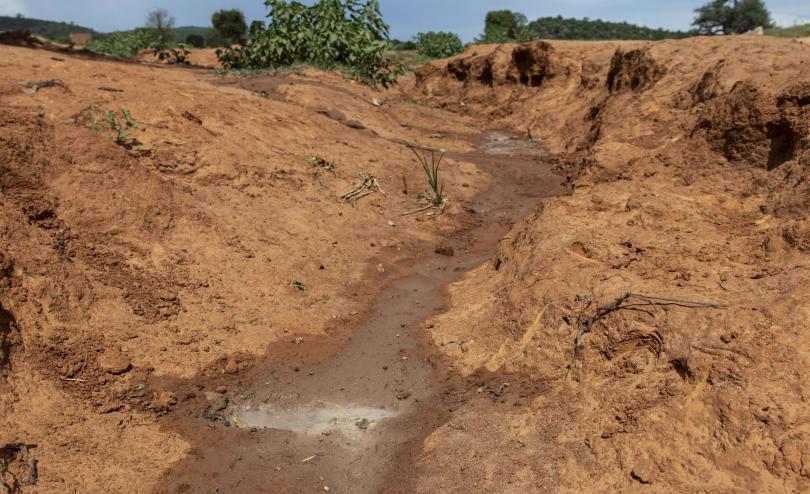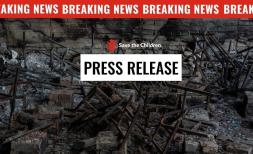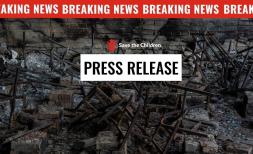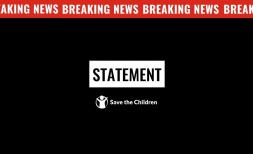Zimbabwe: Children on the frontline as climate and economic crises collide

Zimbabwe’s worsening food crisis is forcing children to eat only once a day and walk for hours across dry rocky terrain to collect water, according to Save the Children. The agency is warning that without a major increase in the humanitarian response in Zimbabwe, lives will be lost as children and their families adopt more extreme coping mechanisms to survive.
Parents have spoken of taking their children out of school to work or because they can’t afford the fees, and marrying their young daughters to wealthier families who have food. Other families are reducing their daily meal intake, selling off livestock and other assets, and migrating – often unsafely – to other countries.
Across the country, at least 7.7 million people in urban and rural areas are severely food insecure, including over 3.8 million children who are hungry and require urgent food assistance.
Save the Children is currently conducting a wide-ranging assessment of the situation in Zimbabwe, and preliminary findings have been alarming.
Siwela, 12, lives with her grandparents in southern Zimbabwe, in a region prone to droughts and floods. Her parents are in South Africa looking for work, and her community is currently suffering from a severe drought:
“I feel pain when I think about hunger. What I've seen change due to the drought is the price hikes [of food], there’s no rain and the trees have no water…. what I wish for my community is that it rains, there's no hunger and people can farm.”
Michelle*, 17, lives in a remote village in southern Zimbabwe with her 9-month old baby, Junior*, and extended family. Michelle and her family have had to reduce the number of meals they have each day, and the children cry from hunger:
“Junior is now nine months. I was pained when I found out he was underweight. I couldn’t sleep. I wasn’t expecting my child to be underweight because I was breastfeeding him. When I go to the clinic to ask for the porridge they say it’s not available. The clinic is very far, it’s about four kilometres. It takes three hours to get to the clinic because of the hills.”
Zimbabwe is facing a complex macro-economic crisis, the worst since 2008, with the highest inflation rate in the world according to the IMF. The economic situation has been characterised by cash shortages, unwavering national debt, high unemployment, and persistent increases in the costs of basic goods and services, all factors which are impacting children’s lives.
The country’s food emergency is also part of a regional climate crisis, with roots in a severe drought that began in 2018. Many rivers, wells and dams have dried up, and children and their families often have to travel hours each day to collect water. While some parts of the country received erratic and uneven rainfall between November 2019 and January 2020, much of the rain fell on parched land, resulting in flooding and topsoil erosion, further impeding the ability of families to farm. The lean season is due to peak during January to March but is expected to last much longer as many farmers have lost their crops and will have nothing to harvest come March.
Save the Children is calling on the donors and the international community to take urgent action now to prevent a deterioration of what is already a critical situation.
Save the Children’s Country Director in Zimbabwe, William Lynch, said:
“This is an extremely complex situation evolving in Zimbabwe, where families that had four or five ways of making a living, can no longer rely on any of them. The preliminary results of our assessments have been grim; we’ve seen spikes in unattended births and a decline in vaccinations as the health system falters.Poor rains have increased the burden of fetching water for children, forcing them to travel longer distances and exposing them to the risk of violence and abuse. For girls in particular, we’re hearing that the situation is leaving them with limited options and is driving them into early marriage.
“Zimbabweans have been pushed to their absolute limits in recent years and now they’re on the brink of collapse. International actors – governments, non-government organisations and donors - must pull together now.”
Save the Children has worked in Zimbabwe since 1983 and is currently scaling up its emergency response to help the most vulnerable children. The agency is focusing on food security, health, nutrition, education and child protection. Save the Children’s Emergency Health Unit has deployed to assess the crisis situation in the country, and set-up emergency health, nutrition and water, sanitation and hygiene (WASH) programming to improve access to basic health and nutrition services and reduce the risk of disease outbreaks.
Spokespeople are available.
To arrange an interview, please contact Daphnee Cook in Nairobi +254 717 524 904 [Mobile and Whatsapp] daphnee.cook@savethechildren.org or Davina Hagan in London +447732 6017612 davina.hagan@savethechildren.org. During out of office hours please contact media@savethechildren.org.uk +44 7831 650409.




